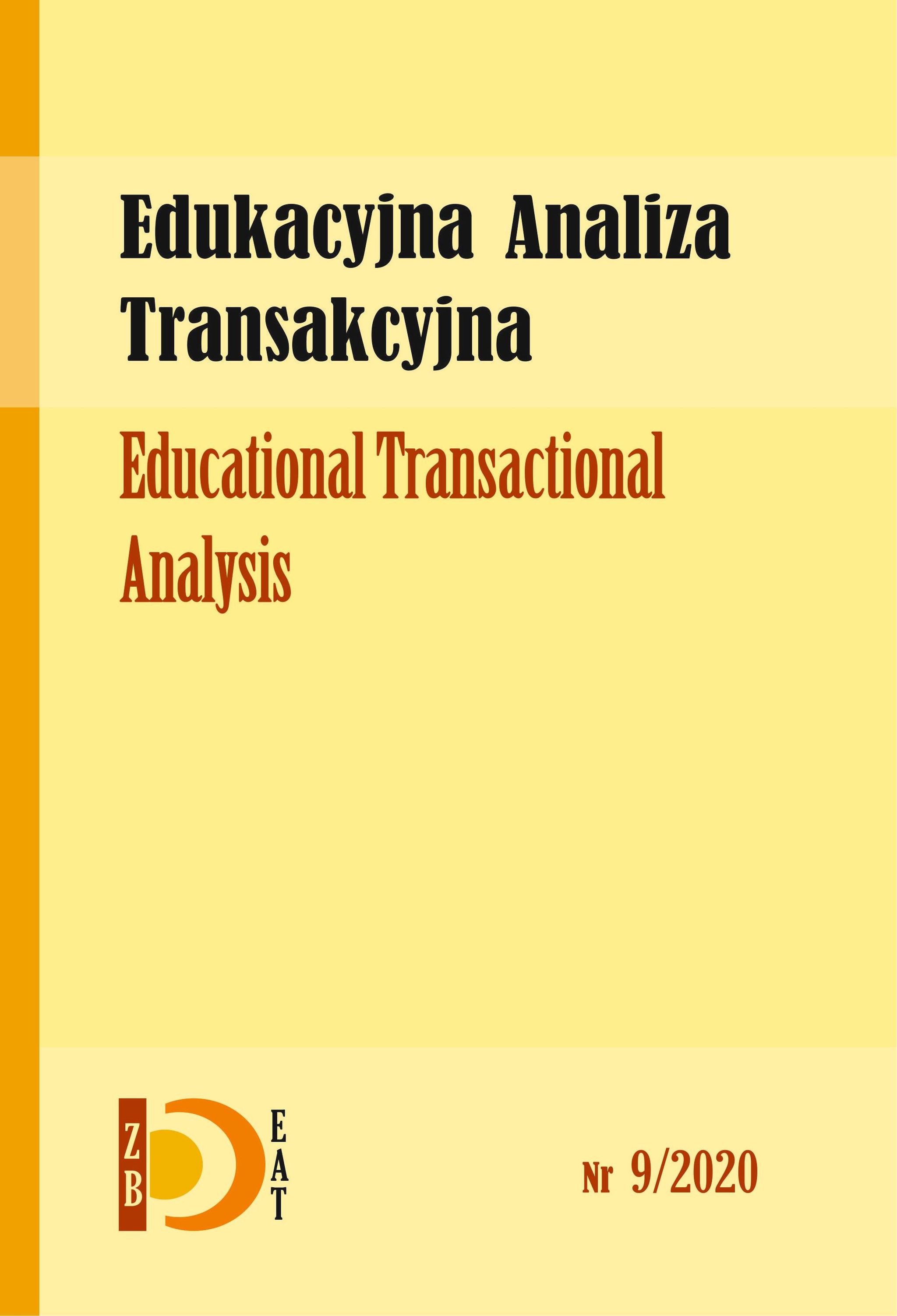Trans-akcja! Seminarium jako wydarzenie w pryzmacie analizy transakcyjnej
- Autor
-
-
Łukasz Michalski
a:1:{s:5:"pl_PL";s:33:"Uniwersytet Śląski w Katowicach";}
-
- Słowa kluczowe:
- Eric Berne, analiza transakcyjna, gra psychologiczna, seminarium
- Abstrakt
-
Niniejszy tekst jest efektem pochylenia się nad tradycją akademickiego fenomenu seminarium badawczego w poszukiwaniu elementów jego topografii (pula cech niezmiennych). Do efektów tych poszukiwań „przyłożone” zostało oprzyrządowanie badawcze analizy transakcyjnej, co pozwoliło na nazwanie kilu gier seminaryjnych, ale także na sproblematyzowanie kwestii granic samego opisu seminarium.
- Pobrania
-
Statystyki pobrań niedostępne.
- Biogram autora
- Bibliografia
-
Aymes M (2007). From-To? Contemporaneities of the Seminar(s). Archive ouverte en Sciences de l'Homme et de la Société, https://halshs.archives-ouvertes.fr/halshs-01419950 [dostęp: 6 XI 2020]
Barthes, R. (1978). A Lover's Discourse: Fragments. New York: Hill and Wang.
Barthes, R. (1982). A Barthes Reader. New York: Hill and Wang.
Barthes, R. (1989). To the seminar. W: R. Barthes, The Rustle of Language. New York: University of California Press.
Berne, E. (1964). Games People Play: The Psychology of Human Relationships. New York: Grove.
Clark, W. (2006). Academic Charisma and the Origins of the Research University. Chicago: University of Chicago Press.
Cornell W. F. , de Graaf A., Newton T., Thunnissen M. (red.) (2016). Into TA: A Comprehensive Textbook on Transactional Analysis. London: Karnac Books.
Dudzikowa M. (2010). Esej o codzienności szkolnej z perspektywy metafory. W: M. Dudzikowa, M. Czerepaniak-Walczak (red.), Wychowanie. Pojęcia – procesy – konteksty (s. 203-246), T. 5. Gdańsk: GWP.
Grzesiuk L., Jakubowska U. (1994). Inne szkoły psychoterapeutyczne. W: L. Grzesiuk (red.) Psychoterapia: Szkoły, zjawiska, techniki i specyficzne problemy (s. 68-85). Warszawa: PWN.
Habermas, J. (1975). Moral Development and Ego Identity. Telos, 24, 41–55. https://doi.org/10.3817/0675024041
Jagieła, J. (2012). Słownik analizy transakcyjnej. Częstochowa: Wydawnictwo im. Stanisława Podobińskiego Akademii im. Jana Długosza, http://ptat.pl/wp-content/uploads/2017/07/SlownikAT.pdf [dostęp: 6 XI 2020]
Latour B. (1983). Give Me a Laboratory and I Will Raise the World. W: K. Knorr, M. Mulkay (red.). Science Observed (s.141-170), London: Sage, http://www.bruno-latour.fr/sites/default/files/12-GIVE-ME-A-LAB-GB.pdf [dostęp: 6 XI 2020]
Markowski M. P. (1999). Dyskurs i pragnienie. W: R. Barthes. Fragmenty dyskursu miłosnego. Warszawa: Wydawnictwo KR.
Miłosz Cz. (1996). Legendy nowoczesności. Kraków: Wydawnictwo Literackie.
Newell, S., Jeffery, D. (2002). Behaviour management in the classroom: Transactional analysis approach. London: David Fulton Publishers.
Szahaj A. (1996). Ironia, majsterkowanie i miłość. W: Z. Sarelo (red.), Moralnosc i etyka w ponowoczesności (149-153). Warszawa: Wydawnictwa Akademii Teologii Katolickiej.
Widawska, W. (2016). Ku czemu wychowywać ma szkoła? Refleksja w oparciu o model analizy transakcyjnej. Edukacyjna Analiza Transakcyjna, 5, 93–109. http://dx.doi.org/10.16926/eat.2016.05.06
Witkowski L (2009). Kultura podatna na zranienia. Rozmowy z duchami: fragmenty myślowe. W: Idem: Ku integralności edukacji i humanistyki II. Postulaty, postacie, pojęcia, próby. Odpowiedź na Księgę jubileuszową (s. 95-113). Toruń: Wydawnictwo Adam Marszałek.
Witkowski, L. (2010). Tożsamość i zmiana: Epistemologia i rozwojowe profile w edukacji. Wrocław: Wydawnictwo Naukowe Dolnośląskiej Szkoły Wyższej.
Žižek, S. (2008). Lacan: Przewodnik krytyki politycznej. Warszawa: Wydawnictwo Krytyki Politycznej.
- Pobrania
- Opublikowane
- 30.12.2020
- Numer
- Nr 9 (2020)
- Dział
- Analiza transakcyjna w edukacji
- Licencja
-
Prawa autorskie (c) 2020 Łukasz Michalski

Utwór dostępny jest na licencji Creative Commons Uznanie autorstwa 4.0 Międzynarodowe.
OŚWIADCZENIE AUTORA:
Mam świadomość, że czasopismo jest wydawane na licencji Creative Commons - Uznanie autorstwa (https://creativecommons.org/licenses/by/4.0/legalcode).
Przesyłając artykuł wyrażam zgodę na jego udostępnienie na tej licencji
Jak cytować
Podobne artykuły
- Paweł Plaskura, Edukacja w dobie generatywnej sztucznej inteligencji: perspektywa analizy transakcyjnej , Edukacyjna Analiza Transakcyjna: Nr 14 (2025)
- Jan Kornaj, Rozwój psychoterapii psychoz w Analizie Transakcyjnej , Edukacyjna Analiza Transakcyjna: Nr 14 (2025)
- Edyta Halista-Telus, Iwona Zychowicz, Orientacja sprawcza i wspólnotowa oraz partycypacja społecznamłodzieży w wieku 14–19 lat – raport z badań , Edukacyjna Analiza Transakcyjna: Nr 14 (2025)
- Małgorzata Świerk, Potrzeby, które nie mieszczą się w planie zajęć – analiza transakcyjna doświadczeń studentów(przyszłych nauczycieli) , Edukacyjna Analiza Transakcyjna: Nr 14 (2025)
- Jarosław Jagieła, dr hab.prof. AJD, Psychopedagogika uczenia się i zachowania, czyli o związkach behawioryzmu z edukacyjną analizą transakcyjną (cz. 2) , Edukacyjna Analiza Transakcyjna: Nr 6 (2017)
- Dorota Pankowska, dr hab., Analiza transakcyjna w edukacji czy edukacyjna analiza transakcyjna? , Edukacyjna Analiza Transakcyjna: Nr 1 (2012)
- Anna Pierzchała, dr, Edukacyjna analiza transakcyjna a inne nurty pedagogiczne wyrosłe na gruncie koncepcji psychoterapeutycznych , Edukacyjna Analiza Transakcyjna: Nr 1 (2012)
- Jarosław Jagieła, dr hab.prof. AJD, [rec.] Stewart, I., Joines, V. (2016). Analiza transakcyjna dzisiaj , Edukacyjna Analiza Transakcyjna: Nr 5 (2016)
- Wiga Bednarkowa, dr hab. prof. AJD, [rec.] J. Jagieła, A. Sarnat-Ciastko, Dlaczego analiza transakcyjna? Rozmowy o zastosowaniu analizy transakcyjnej w pracy nauczyciela i wychowawcy , Edukacyjna Analiza Transakcyjna: Nr 4 (2015)
- Jarosław Jagieła, Psychopedagogika sensu i wartości, czyli o związkach terapii egzystencjalnej z analizą transakcyjną. (cz. 6) , Edukacyjna Analiza Transakcyjna: Nr 10 (2021)
Możesz również Rozpocznij zaawansowane wyszukiwanie podobieństw dla tego artykułu.


